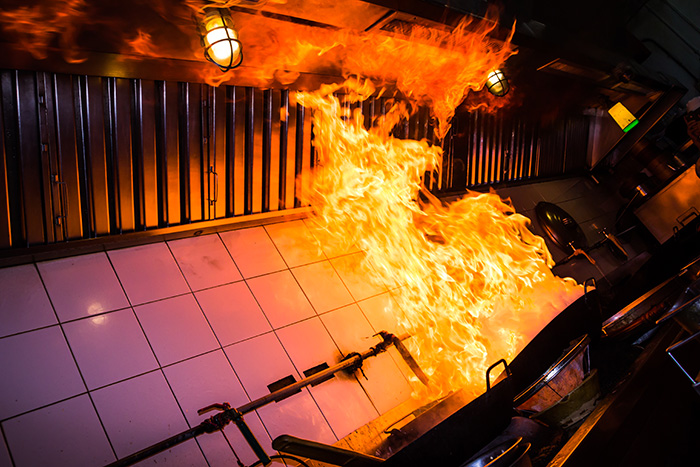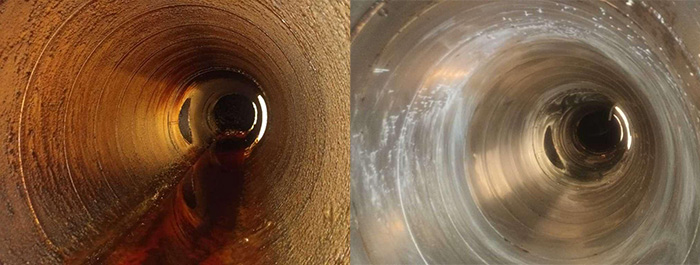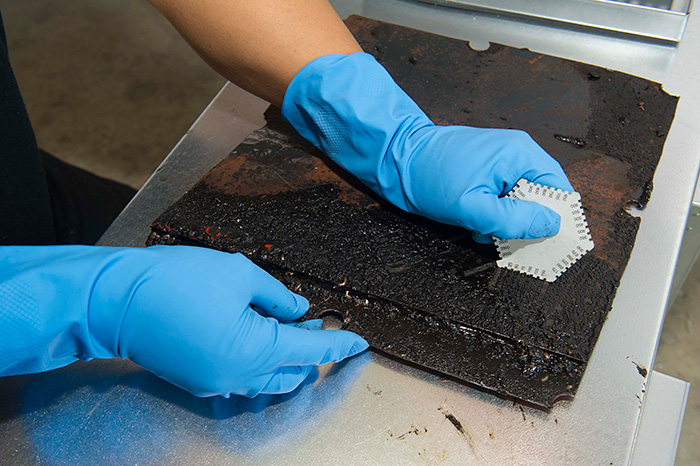TR19® Grease – A Big Fan Of Fire Safety

Regardless of the type of cuisine, every kitchen extract system faces the same challenge, a build-up of fat, oil and grease deposits on the extraction hood and ductwork, which must be controlled to ensure fire safety. Gary Nicholls, MD of Swiftclean, explains the importance of compliance with TR19® Grease for stadiums.

In stadiums and sporting venues, there are often a number of catering outlets, which are close to executive offices, hospitality suites and seating areas in the stands. In all areas of the stadium, fire safety is paramount. Kitchen extract fires are to be avoided at all costs, as they have the potential to spread fire rapidly to other parts of a building. Should a kitchen fire take hold in the extract ductwork, the fire can easily spread, especially to the floors above the catering outlet.
The grease deposits on the inner surface of extract ductwork will act as fuel for the fire and the ductwork itself can act as a chimney, causing fire to spread rapidly to other parts of the building. This can make an otherwise containable fire into a major incident, posing a threat to neighbouring properties.
As the ductwork is often installed with the outlet at roof level, extensive damage to the roof is an all-too-common occurrence. In many locations, there is also a danger of fire affecting adjoining property.
To minimise the risk of fire in the extract system, there is a legal requirement to remove grease deposits at regular intervals, according to how heavily and how frequently the kitchen, and therefore the extraction system, is used. Cleaning should be carried out according to the TR19® Grease specification, which is issued by the Building Engineering Services Association (BESA). To achieve compliance, all grease deposits must be completely removed from the entire extraction system, including the canopy, hood, fan and all ductwork. In some older systems, there are insufficient access hatches to be able to reach the entire system. In these cases, additional access hatches should be retrofitted to allow access to the whole system, particularly around angles and turns in the ductwork, which tend to encourage grease to collect.

It is a common misconception that grease deposits need to be very thick in order to constitute a fire risk, but this is simply not the case. Although we have often seen extremely heavy fat deposits, particularly on our first cleaning of an extract system, the TR19® Grease specification stipulates that the grease layer should be controlled within an average of 200 microns over the surface of the ductwork. To put this into perspective, 200 microns is roughly half the thickness of the average business card, so a relatively thin grease film can constitute a real fire risk, especially in warmer weather, when fire can take hold more easily.

If fire damage occurs, you will need your buildings insurance to pay out so that you can repair and rebuild as needed. However, if the fire investigators establish that the ductwork was not compliant with TR19® Grease, and cleaning had not been carried out for some time, the building insurer is unlikely to pay out on the policy.
Under the Regulatory Reform (Fire Safety) Order 2005, the Responsible Person for the property may be prosecuted for negligence. If found guilty of negligence, they may face a custodial sentence, especially if there have been any injuries or fatalities as a result of the fire.
It is equally important, therefore, to keep good records of your compliance with TR19® Grease. The specification itself recommends that property owners or managers should use a member of the Vent Hygiene Register, with cleaning being caried out by competent technicians with the relevant specialist training. Register members will provide post-clean certification issued by BESCA (Building Engineering Services Competence Assessment Ltd), which is run by BESA and independently accredited by UKAS. This provides valuable evidence to both insurance companies and the authorities that you have done all that is required of you to comply with your legal responsibilities under TR19® Grease.
Ductwork can be out of sight and out of mind. However, as an essential – and legally required – fire prevention measure, compliance with TR19® Grease should always be front of mind and firmly on the facilities manager’s game plan.

Click the article to enlarge it.












































